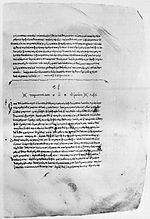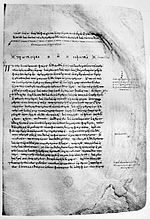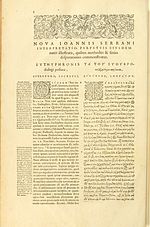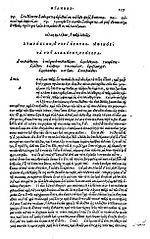In the dialogue, Socrates recounts the life of Hipparchus, a tyrant of 6th century Athens and son of the famous ruler Peisistratus. Hipparchus was known...
4 KB (566 words) - 03:08, 16 May 2024
Hipparchus, the common Latinization of the Greek Hipparkhos, can mean: Hipparchus, the ancient Greek astronomer Hipparchic cycle, an astronomical cycle...
941 bytes (150 words) - 14:49, 10 April 2022
Clitophon Cratylus Critias Crito Epinomis Euthydemus Euthyphro Gorgias Hipparchus Hippias Major Hippias Minor Ion Laches Laws Lysis Menexenus Meno Minos...
14 KB (1,623 words) - 18:41, 28 October 2024
Τίμαιος, translit. Timaios, pronounced [tǐːmai̯os]) is one of Plato's dialogues, mostly in the form of long monologues given by Critias and Timaeus, written...
26 KB (3,438 words) - 09:43, 10 October 2024
Plato (redirect from Dialogues of Plato)
Alcibiades I (*), Alcibiades II (‡), Clitophon (*), Epinomis (‡), Letters (*), Hipparchus (‡), Menexenus (*), Minos (‡), Lovers (‡), Theages (‡) The following works...
94 KB (9,650 words) - 09:33, 9 October 2024
translit. Phaidros), written by Plato, is a dialogue between Socrates and Phaedrus, an interlocutor in several dialogues. The Phaedrus was presumably composed...
44 KB (6,317 words) - 11:07, 11 October 2024
Meno (redirect from Dialogue of meno)
Meno (/ˈmiːnoʊ/; Greek: Μένων, Ménōn) is a Socratic dialogue written by Plato. Meno begins the dialogue by asking Socrates whether virtue is taught, acquired...
18 KB (2,466 words) - 02:12, 3 November 2024
Crito (redirect from Crito (dialogue))
KRY-toh or /ˈkriːtoʊ/ KREE-toh; Ancient Greek: Κρίτων [krítɔːn]) is a dialogue that was written by the ancient Greek philosopher Plato. It depicts a conversation...
44 KB (5,822 words) - 12:26, 29 October 2024
Apology (Plato) (redirect from Apology (dialogue))
Sokrátous; Latin: Apologia Socratis), written by Plato, is a Socratic dialogue of the speech of legal self-defence which Socrates (469–399 BC) spoke at...
34 KB (4,506 words) - 08:46, 25 October 2024
Παρμενίδης) is one of the dialogues of Plato. It is widely considered to be one of the most challenging and enigmatic of Plato's dialogues. The Parmenides purports...
30 KB (4,443 words) - 22:07, 22 October 2024
Critias (/ˈkrɪtiəs/; Greek: Κριτίας), one of Plato's late dialogues, recounts the story of the mighty island kingdom Atlantis and its attempt to conquer...
15 KB (1,994 words) - 20:50, 22 October 2024
Protagoras (/proʊˈtæɡərəs/; Greek: Πρωταγόρας) is a dialogue by Plato. The traditional subtitle (which may or may not be Plato's) is "or the Sophists"...
19 KB (2,839 words) - 10:38, 5 September 2024
Phaedo (redirect from Phaedo (dialogue))
the best-known dialogues of Plato's middle period, along with the Republic and the Symposium. The philosophical subject of the dialogue is the immortality...
31 KB (4,590 words) - 16:03, 1 November 2024
name of a dialogue by Plato. Most modern scholars agree that it was written mostly during Plato's so-called middle period. In the dialogue, Socrates is...
21 KB (2,434 words) - 00:47, 4 November 2024
Laws (Greek: Νόμοι, Nómoi; Latin: De Legibus) is Plato's last and longest dialogue. The conversation depicted in the work's twelve books begins with the question...
22 KB (2,728 words) - 18:21, 2 November 2024
possession. It is one of the shortest of Plato's dialogues. Socrates, the Greek philosopher. In this dialogue, he questions the nature of art and of divine...
9 KB (1,264 words) - 04:37, 6 October 2024
(/ˈɡɔːrɡiəs/; Greek: Γοργίας [ɡorɡíaːs]) is a Socratic dialogue written by Plato around 380 BC. The dialogue depicts a conversation between Socrates and a small...
21 KB (3,158 words) - 08:55, 23 October 2024
form of a dialogue, in this case between Socrates and the young mathematician Theaetetus and his teacher Theodorus of Cyrene. In the dialogue, Socrates...
30 KB (4,229 words) - 01:15, 23 October 2024
Euthyphro (category Dialogues of Plato)
is a Socratic dialogue whose events occur in the weeks before the trial of Socrates (399 BC), between Socrates and Euthyphro. The dialogue covers subjects...
25 KB (3,491 words) - 14:30, 29 October 2024
Euthydemus (Greek: Εὐθύδημος, Euthydemes), written c. 384 BC, is a dialogue by Plato which satirizes what Plato presents as the logical fallacies of the...
4 KB (450 words) - 21:40, 22 October 2024
The Charmides (/ˈkɑːrmɪdiːz/; Greek: Χαρμίδης) is a dialogue of Plato, in which Socrates engages a handsome and popular boy named Charmides in a conversation...
12 KB (1,694 words) - 14:06, 14 October 2024
The Laches (/ˈlækiːz/; Greek: Λάχης) is a Socratic dialogue written by Plato. Participants in the discourse present competing definitions of the concept...
10 KB (1,263 words) - 14:46, 2 August 2024
although the Platonic dialogue Hipparchus (not really by Plato, but probably of the fourth century BC) attributes it to Hipparchus, son of Peisistratos...
12 KB (1,263 words) - 18:28, 24 October 2024
The Sophist (Greek: Σοφιστής; Latin: Sophista) is a Platonic dialogue from the philosopher's late period, most likely written in 360 BC. In it the interlocutors...
16 KB (2,137 words) - 22:41, 22 October 2024
the stem Λύσιδ-, from which the infrequent translation Lysides), is a dialogue of Plato which discusses the nature of philia (φιλία), often translated...
19 KB (2,886 words) - 00:29, 4 November 2024
Philebus, Symposium, Phaedrus 4th tetralogy Alcibiades I, Alcibiades II, Hipparchus, Lovers 5th tetralogy Theages, Charmides, Laches, Lysis 6th tetralogy...
18 KB (322 words) - 11:51, 18 September 2024
Hindu idealism Hindu philosophy Hinduism Hipparchia of Maroneia Hipparchus (dialogue) Hippasus Hippias Hippias Major Hippias Minor Hippias of Elis Hippo...
73 KB (7,034 words) - 20:17, 4 November 2024
ancient Greek mathematician Hipparchus who appears from evidence in Plutarch to have known of these numbers. The Schröder–Hipparchus numbers may be used to...
12 KB (1,391 words) - 05:39, 4 May 2024
Symposium (Plato) (redirect from Symposium (Plato dialogue))
[sympósi̯on], romanized: Sympósion, lit. 'Drinking Party') is a Socratic dialogue by Plato, dated c. 385 – 370 BC. It depicts a friendly contest of extemporaneous...
40 KB (5,468 words) - 15:37, 29 October 2024
Latin: Politicus), also known by its Latin title, Politicus, is a Socratic dialogue written by Plato. The text depicts a conversation among Socrates, the mathematician...
5 KB (569 words) - 11:54, 28 March 2024












